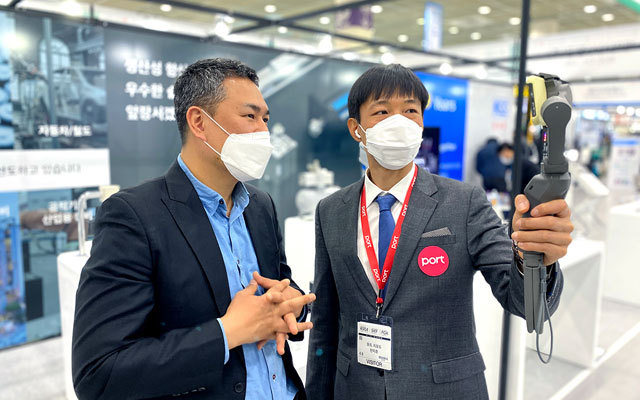When the pandemic triggered unprecedented border closures across the world, entrepreneur and frequent flyer Philip Man suddenly found himself unable to freely travel anywhere.
That lack of freedom to travel led the digital nomad to set up remote travel platform Port at the height of the pandemic in April 2020. Alongside co-founder and CTO, William Sjahrial, Man came up with the idea of having people around the world show homebound travellers their local places through a video call. “We were working remotely, so we thought, ‘Can we travel remotely?’ That’s how we started,” recalled Man, co-founder and CEO of the company.

The Singapore-based start-up connects individual professionals and businesses with personal guides from around the world to give them remote tours of tradeshows and exhibitions through live video calls. The client can issue instructions to the guide, and control the camera remotely, taking and saving photos along the way.
Besides being an avenue to gain global market insights, the platform also avails users of an efficient, cost-effective way to meet new business partners and access events remotely.
“Before Port, when you think about international business travel, you either go and spend a few thousand dollars or you don’t go and spend nothing. With Port, we are offering an in-between solution for a few hundred dollars, and it will open up completely new possibilities for people to visit and explore places around the world easily and affordably,” Man said.
“Depending on where you are video-calling into, we also offer guided exhibition tours and interpretation as well, pre-selecting for you the companies that are relevant to you.”
Man believes that Port allows users more efficient use of their time.
A remote visit to a tradeshow with a personal bilingual guide via Port typically charges between US$60 and US$90 per hour, depending on location and guide expertise. The company also works directly with event organisers and venue owners to enable locations to be remotely visited, with customised prices.

Man stressed that Port is not designed to replace actual travel and in-person event attendance, but rather, to be a supplement to existing travels.
“Port is not for deep business conversations, but rather, for introductions and connections (at tradeshows and exhibitions),” he said.
Noting how 78 per cent of Port’s trial users say that they would not have gone to that event even if there was no pandemic, Man said that the platform allows business travellers to “reach places that previously were not economically justifiable to go”.
He cited a case study of two buyers from the UK who remotely visited the AI Expo Korea via Port. “In their session, they saw 80 booths, spoke to 12 companies, and had follow-up meetings with three of them. Total cost: two hours and US$120. Now, compare that to the time and cost of two people flying to South Korea for two days and having an interpreter on-site,” he said. “Port costs a fraction of that in time and money.”
Currently, Port is targeting English-speaking countries inbound to South Korea, Taiwan and Dubai – locations where in-person tradeshows are still happening amid the pandemic. The company plans to expand to North American and European cities later this year as “those are big tradeshow markets” said Man, adding that China will follow next year.
To date, Port has served over 1,200 paid users on its remote tours and remote event visits.
To grow its customer base, Port focuses on B2B2C models where it helps events or venues to be remote-visit enabled, so they can lower the bar to visit and tap into a larger audience for their event.
“We provide the entire back office infrastructure to them to make that happen, from booking and video conferencing software to feedback and analysis. Using this B2B2C model will help us reach the end-user,” said Man.
In April, Port secured a pre-seed investment from Japan travel agency H.I.S. Group, a six-figure sum which Man said will go towards “growing the team and product development”.
While the company is currently focused on the business events industry, with offerings in tradeshows and fairs, there are plans to expand its offerings to include corporate site visits, educational field trips, product and workplace inspections, and more.
Post-pandemic, the Port platform will continue to maintain its relevance, said Man. “Once face-to-face events resume, our inventory of locations and events will grow, and our platform will become even more valuable to our users,” he elaborated. “And the great thing is, we will have a generation who has been trained for 18 to 24 months on doing everything through video calls, from meetings and teambuilding to yoga classes and event and location visits.”





















